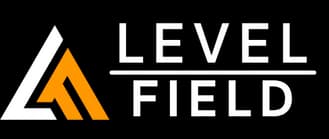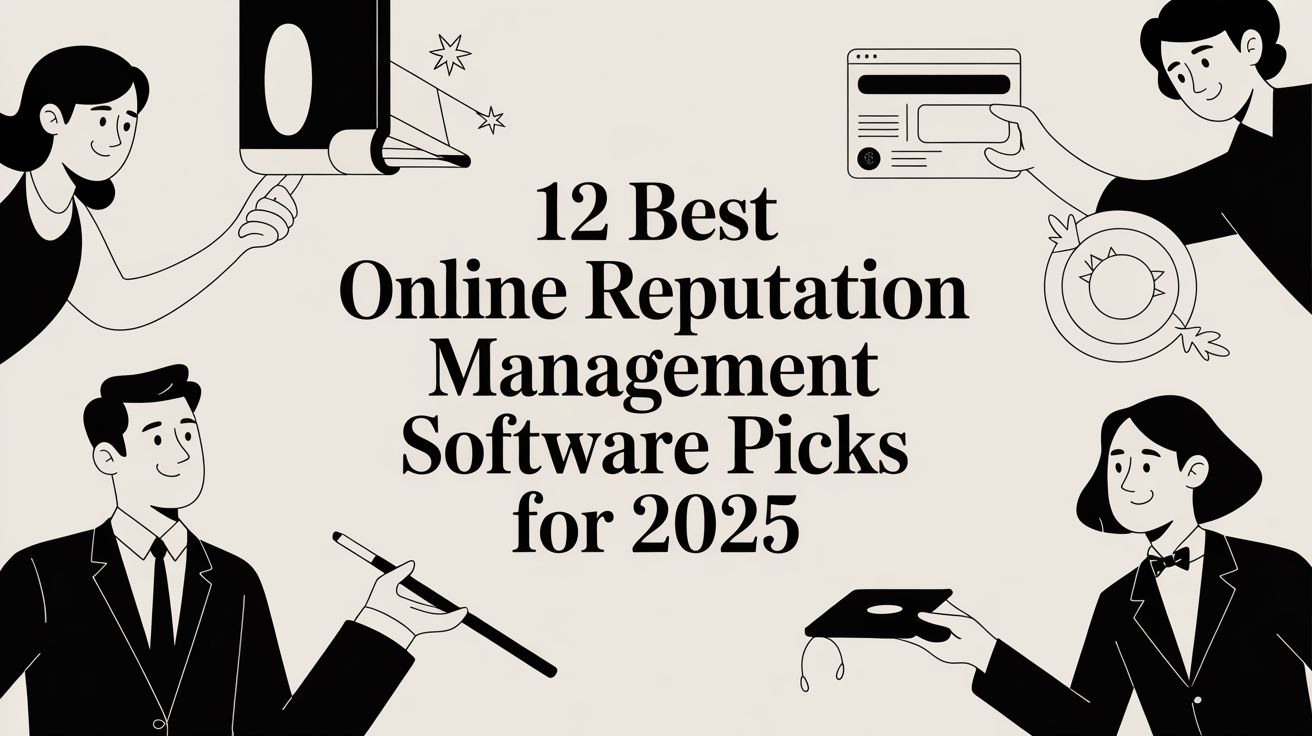
In today's marketplace, a single negative review, misleading ad, or fake social media account can significantly damage your brand's credibility and bottom line. Proactively managing your online presence is no longer a luxury, it's a critical business function. But with a vast landscape of tools, from AI-powered review responders to hands-on takedown services, choosing the right solution can feel overwhelming.
This guide cuts through the noise. We provide a detailed breakdown of the 12 best online reputation management software and service platforms available today. We move beyond marketing copy to analyze core features, ideal use cases for specific industries like law firms and healthcare, and provide a candid look at both pros and cons. Each option includes screenshots and direct links to help your evaluation.
Whether you're an e-commerce brand needing to generate positive reviews, a local business monitoring brand mentions, or a medical practice needing to address harmful content, this resource will equip you to make an informed decision. The goal is to help you find the right tool to protect the reputation you've worked so hard to build. For a deeper dive into the fundamental principles, you can explore a comprehensive guide to online reputation management. This roundup, however, focuses specifically on the software that puts those principles into practice, helping you find the perfect fit for your budget and operational needs.
1. LevelField
LevelField distinguishes itself not as a traditional DIY software platform, but as a specialized, full-service reputation enforcement partner. It’s the premier choice for businesses that require expert intervention to remove damaging, deceptive, or false content from the web. Instead of providing a dashboard and leaving the complex work to you, LevelField manages the entire takedown process from investigation to resolution, making it one of the best online reputation management solutions for targeted, high-stakes issues.
This service is ideal for organizations that lack the time, expertise, or resources to navigate the labyrinth of platform policies for content removal. The team, led by a founder with legal training (J.D.), leverages deep policy knowledge to file compliant takedown requests on your behalf. This legally informed, hands-on approach is particularly effective for complex cases like fake negative reviews, brand impersonations, counterfeit product listings, and misleading advertisements.
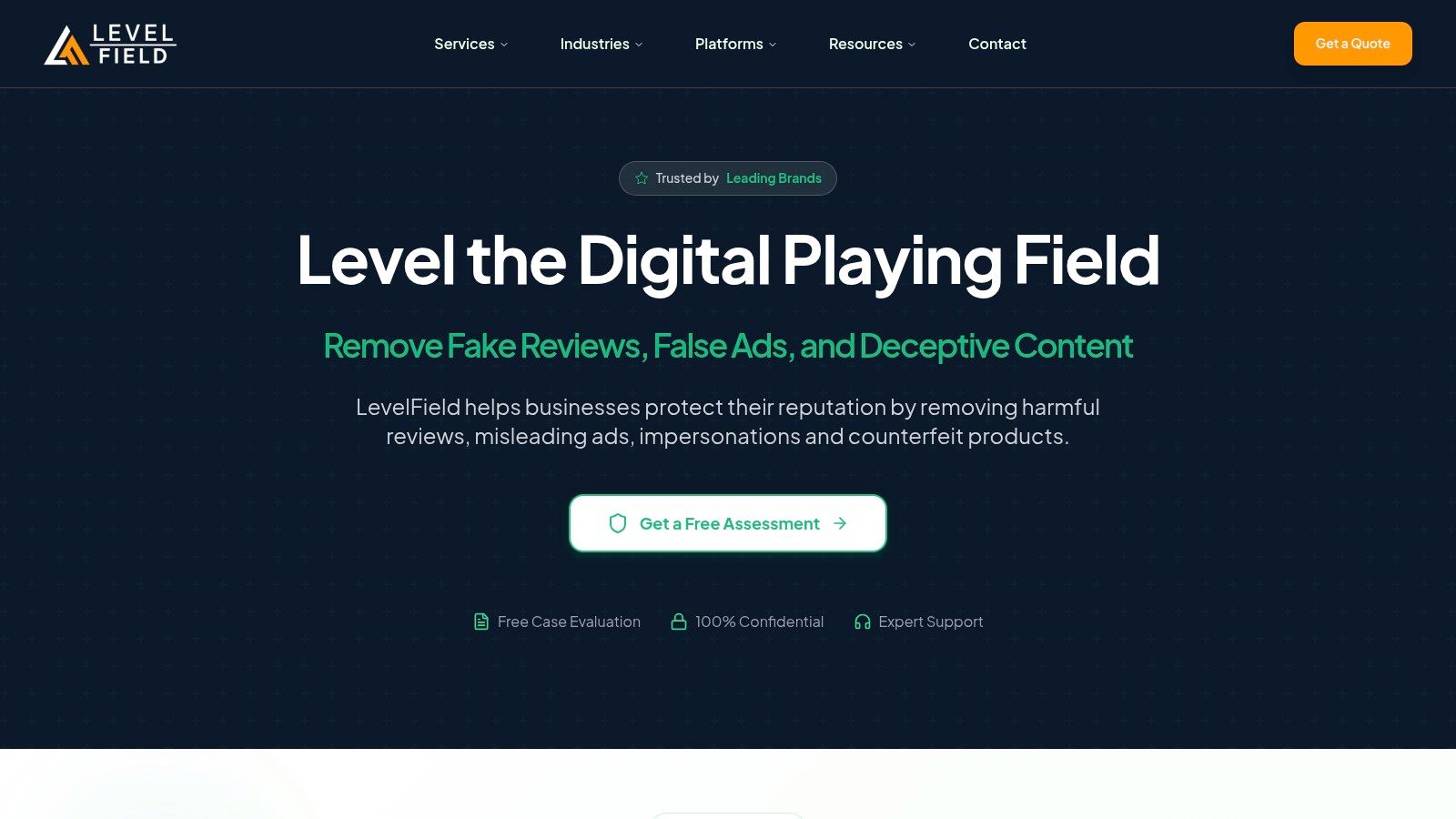
Key Features & Benefits
- Expert-Led Takedown Service: LevelField handles every step: case investigation, evidence gathering, compliant filing, and all communications with platforms. This end-to-end management frees your team to focus on core business operations.
- High Success Rate: The company reports a 95% success rate for review removals, a figure supported by client testimonials. For example, law firm AG Law NJ credited LevelField with removing a harmful Google review in just 48 hours, highlighting the service's speed and effectiveness.
- Broad Platform Coverage: Their expertise spans a wide digital footprint, including major review sites (Google, Yelp, Trustpilot), marketplaces (Amazon, eBay, Etsy), social media (YouTube, X, Reddit), and ad networks (Google Ads, Meta).
- Legally Informed Strategy: By operating strictly within platform terms of service and leveraging a deep understanding of policy violations, LevelField maximizes the probability of a successful removal without resorting to questionable tactics.
Who is it Best For?
LevelField is the definitive choice for businesses needing a decisive, hands-off solution to specific reputational threats. It is particularly valuable for:
- Law firms and healthcare providers whose professional credibility is paramount.
- E-commerce sellers fighting counterfeit listings and fake product reviews.
- Small and medium-sized businesses that have been targeted by coordinated negative campaigns or defamatory content and need a powerful advocate.
While it is not a traditional software tool for monitoring brand mentions, its focused, results-driven service offers unparalleled value for resolving critical reputation issues.
Pricing: LevelField offers a free, confidential case evaluation to assess the situation and provide a custom quote. Pricing is based on the complexity and scope of the required enforcement action.
Website: https://levelfield.io
2. G2 – Online Reputation Management software category
G2 is not a single piece of software, but rather a B2B marketplace where you can compare hundreds of tools. Think of it as the starting point for your research, offering a comprehensive, filterable database of the best online reputation management software solutions, all backed by verified user reviews. It excels at helping businesses shortlist potential vendors before committing to demos or trials.
Key Features and User Experience
The platform's strength lies in its crowdsourced data. You can filter solutions based on specific business needs like e-commerce review monitoring or social media management capabilities. G2's Grid and Quadrant reports provide a visual snapshot of market leaders, contenders, and niche players, updated seasonally to reflect current user satisfaction and market presence.
- Verified Reviews: Each listing includes detailed pros, cons, and specific use cases from real users.
- Comparison Tools: The grid-based comparison feature lets you see key features of multiple platforms side-by-side.
- Direct Vendor Access: From a vendor's page, you can often link directly to their site to request a demo or view pricing.
Pros and Cons
Pros:
- Provides deep, up-to-date user feedback to narrow choices quickly.
- Excellent vendor coverage for both U.S. and global markets.
Cons:
- Pricing information can be vague; many listings require you to contact the vendor directly for a quote.
- Popular tools often have numerous add-ons, making direct price comparisons difficult without a demo.
Website: https://www.g2.com/categories/online-reputation-management
3. Capterra – Reputation Management Software hub
Like G2, Capterra serves as a comprehensive B2B software directory rather than a single tool. It is an excellent resource for benchmarking market pricing and comparing product features side-by-side. Capterra helps businesses understand typical costs and functionalities, enabling them to identify category leaders before engaging directly with vendors. It's a key destination for those in the initial research phase looking for the best online reputation management software.
Key Features and User Experience
Capterra's platform excels at providing clear, structured data to simplify the comparison process. Its buyer’s guide often includes typical price ranges and common features organized by tier, giving users a realistic budget expectation. The user interface is straightforward, with powerful filters that let you narrow down options based on specific business requirements.
- Side-by-Side Comparison: The tool allows you to select multiple products and view their features, pricing models, and target industries in an easy-to-read table.
- Detailed Filters: Users can filter software by pricing model (e.g., per user, subscription), available integrations, and deployment type (cloud-based or on-premise).
- User Reviews and Roundups: Capterra aggregates verified user reviews and publishes regular "category leader" reports to highlight top-performing solutions.
Pros and Cons
Pros:
- Provides clear pricing expectations and vendor-agnostic comparisons.
- Easy navigation for benchmarking both cost and feature sets.
- Strong filtering capabilities help narrow the field effectively.
Cons:
- Many vendors still list “contact for pricing,” so exact costs often require direct outreach.
- The entry-level prices shown may not reflect necessary add-ons or per-location pricing, which can be misleading.
Website: https://www.capterra.com/reputation-management-software/
4. GetApp – Category Leaders for Reputation Management
GetApp, part of the Gartner family alongside Capterra and Software Advice, functions as a powerful discovery engine for small and medium-sized businesses (SMBs). Rather than being a single tool, it offers curated lists of top-rated apps, making it an excellent resource for finding the best online reputation management software tailored to SMB needs. Its "Category Leaders" reports provide a quick, data-driven snapshot of the market's top performers.
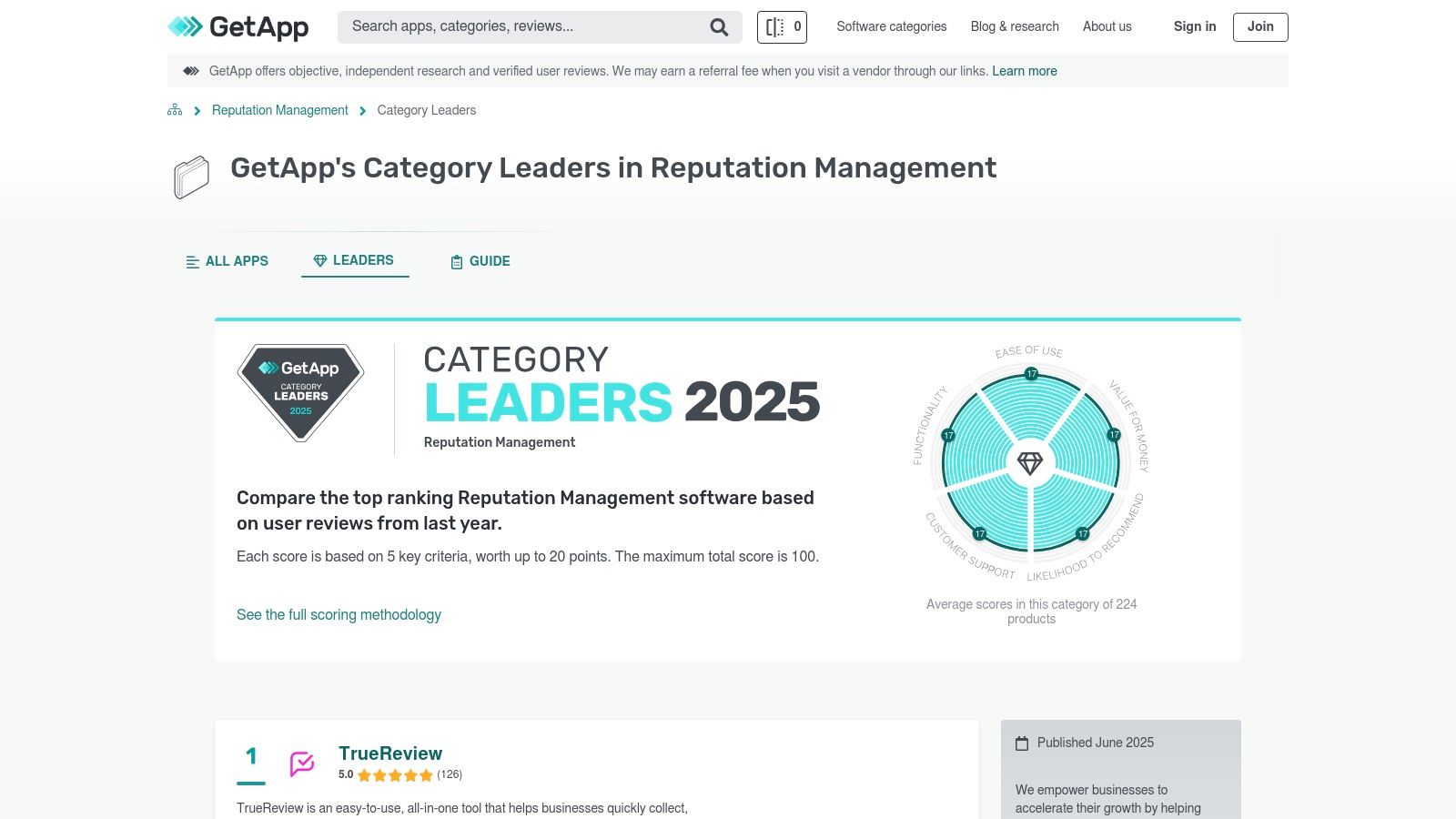
Key Features and User Experience
The platform is designed for efficiency, helping SMB buyers quickly identify user-approved solutions without exhaustive research. GetApp’s annual "Category Leaders" scoring system evaluates software across five key dimensions: ease of use, value for money, functionality, customer support, and likelihood to recommend. This provides a well-rounded view of a tool's real-world performance.
- Filterable Shortlists: Users can easily drill down into subcategories like "review management" or "social media monitoring" to find tools with specific capabilities.
- SMB-Centric Ratings: Reviews and insights are often from users at smaller companies, providing relevant context for other SMBs.
- Direct Vendor Access: Each listing includes one-click links to visit vendor websites, request demos, or start free trials, streamlining the next steps in the buying process.
Pros and Cons
Pros:
- Provides a quick way to find highly-rated and user-vetted options.
- Strong focus on discovering newer and emerging tools that are SMB-friendly.
- The scoring methodology offers a balanced view beyond just features.
Cons:
- Lacks detailed information on enterprise-level deployments and integrations.
- You must navigate to individual vendor sites for specifics on advanced features and pricing.
Website: https://www.getapp.com/marketing-software/reputation-management/category-leaders/
5. Birdeye – Reviews and Reputation Platform
Birdeye is an end-to-end customer experience platform designed to help local and multi-location businesses dominate online reviews and manage their digital presence. It excels at automating the process of generating reviews, monitoring feedback across a vast network of sites, and engaging with customers from a single dashboard. This makes it one of the best online reputation management software choices for scaling customer feedback initiatives efficiently.
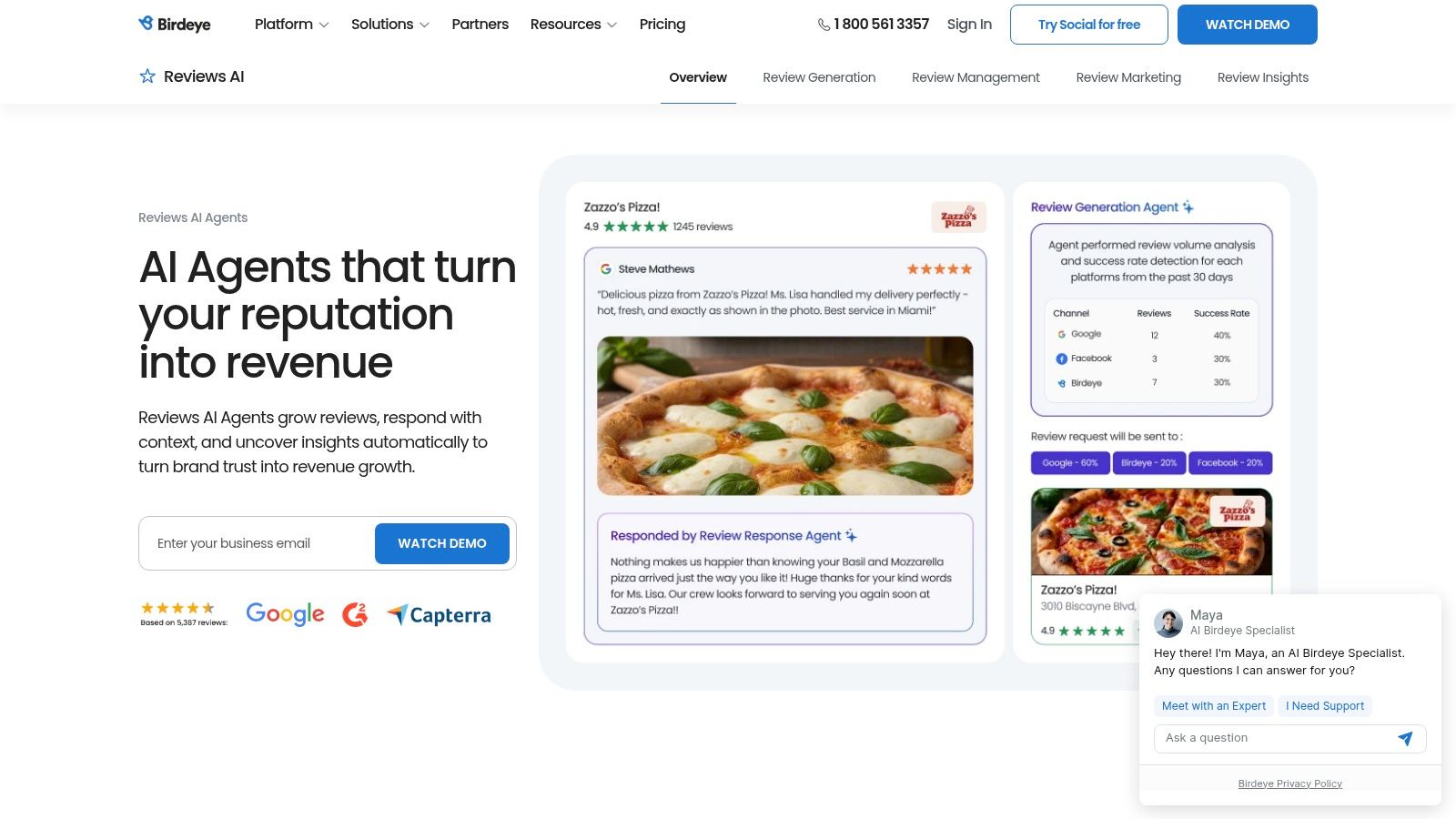
Key Features and User Experience
Birdeye's platform is built around a unified inbox that consolidates reviews, social media mentions, and messages from over 200 sources. The system uses AI-powered tools to help businesses generate authentic reviews via SMS and email, automatically respond to feedback with on-brand templates, and analyze sentiment across thousands of data points. This is particularly valuable for franchises or businesses with multiple storefronts needing consistent brand management.
- Unified Review Inbox: Manage and respond to reviews from Google, Facebook, and industry-specific sites all in one place.
- AI-Powered Responses: Use AI agents to draft personalized, on-brand replies to customer reviews, saving significant time.
- Multi-Location Analytics: Roll-up reporting provides a high-level view of reputation metrics across all locations, with options to drill down into specific branches.
- Review Marketing Widgets: Easily showcase your best reviews directly on your website to build social proof and convert more visitors.
Pros and Cons
Pros:
- Excellent at scaling review generation and response management across many locations.
- Extensive coverage of over 200 review sites provides deep market insight.
- AI features significantly streamline the workflow for busy teams.
Cons:
- Pricing is custom and location-based, requiring a direct sales quote for an accurate estimate.
- Some of the most powerful features may be gated behind higher-priced tiers, potentially making it expensive for smaller businesses.
Website: https://birdeye.com/reviews/
6. Podium – Reviews + Messaging for Local Businesses
Podium is an AI-powered platform designed specifically for local businesses, transforming customer interactions into powerful reputation assets. Its core strength is using SMS to streamline communication, from review invitations to payment collection. This SMS-first approach makes it one of the best online reputation management software solutions for U.S. local service businesses that rely on fast, direct customer engagement.
Key Features and User Experience
The platform centralizes customer interactions into a single inbox, combining messages from webchat, social media, and SMS. This unified view allows businesses to respond instantly and send review requests at the optimal moment, such as right after a service is completed. Podium offers vertical-specific packages tailored for industries like home services, retail, and automotive, providing relevant onboarding resources.
- SMS Review Invites: Send automated or manual review requests via text message, leading to higher open and response rates.
- Centralized Messaging Inbox: Manage all customer conversations from webchat, Google Business Profile, and social media in one place.
- Integrated Payments: Request and process payments directly within the messaging thread, creating a seamless customer journey.
Pros and Cons
Pros:
- Excellent for SMS-driven review generation and rapid customer replies.
- Strong adoption among U.S. local service businesses with industry-specific support.
Cons:
- Pricing is custom by industry and location and requires a direct quote.
- Messaging limits and carrier fees (e.g., 10DLC) apply and vary by plan, adding potential costs.
Website: https://www.podium.com/
7. Reputation (formerly Reputation.com) – Enterprise ORM & CX Suite
Reputation offers an enterprise-grade platform that goes beyond standard review management to include surveys, social media, business listings, and competitive intelligence. It's specifically built for multi-location businesses and highly regulated industries like automotive, healthcare, and financial services that require strict governance, large-scale reporting, and a closed-loop system for customer feedback.
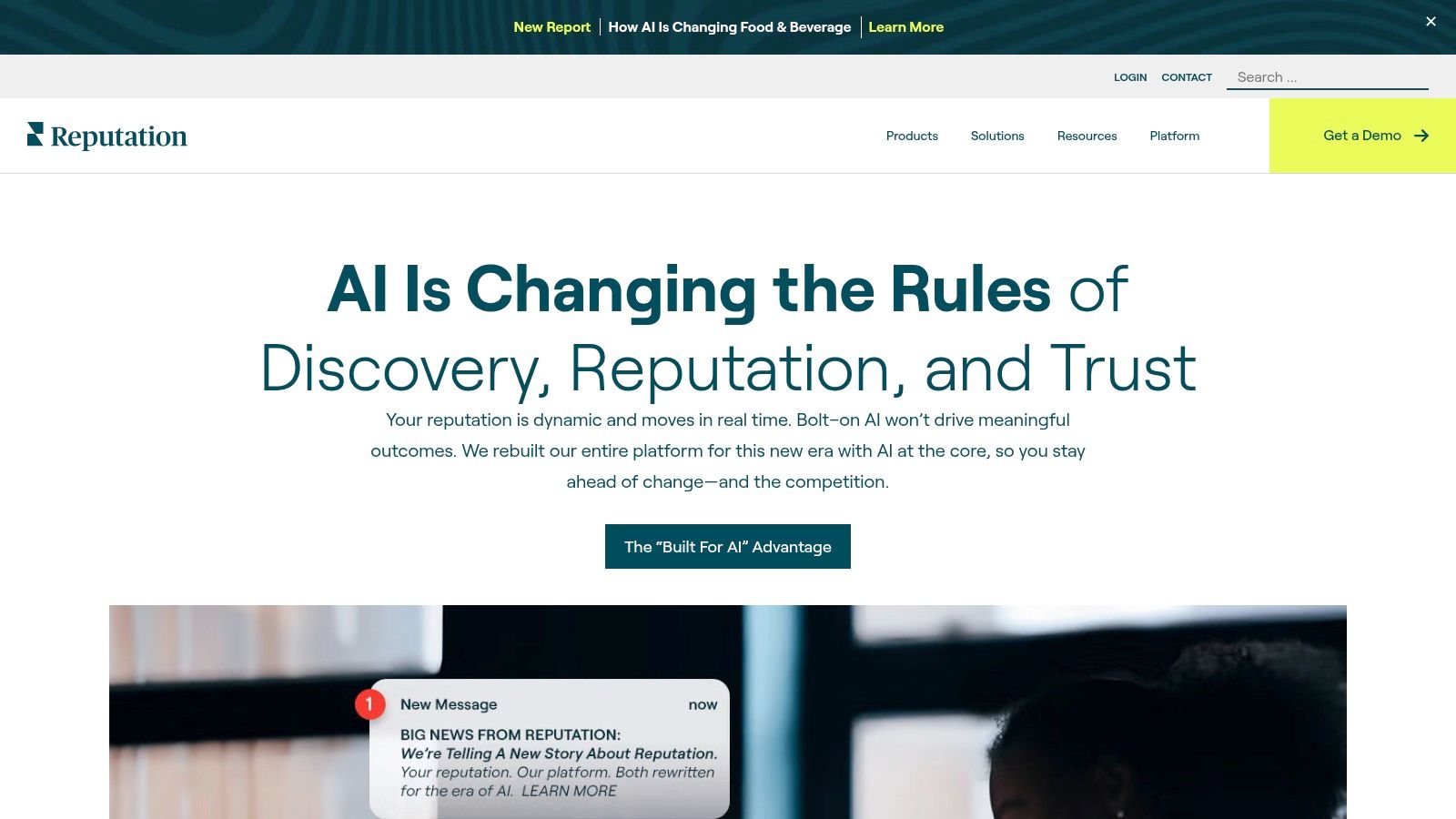
This platform excels at unifying complex reputation data into a single source of truth, making it one of the best online reputation management software choices for large-scale operations. For those new to the field, this platform demonstrates the core principles detailed in this complete online reputation management guide.
Key Features and User Experience
The platform consolidates review monitoring, social publishing, and customer surveys into unified dashboards. This allows brand managers to enforce consistency across hundreds or thousands of locations. Its strength lies in workflows designed for regulated environments, ensuring compliance and secure customer interactions.
- Closed-Loop Feedback: Integrates customer surveys and ticketing systems to address issues directly and improve service.
- Enterprise Governance: Provides robust permission controls and analytics for managing a brand's reputation at scale.
- Industry-Specific Workflows: Offers tailored solutions and integrations for industries with unique compliance needs.
Pros and Cons
Pros:
- Purpose-built for large, multi-location organizations with complex needs.
- Frequently ranks as a top performer in enterprise ORM reports and G2 grids.
Cons:
- Pricing is at the enterprise level and quote-based, making it inaccessible for smaller businesses.
- A reported security incident in October 2025 involving exposed logs requires careful due diligence from potential customers.
Website: https://reputation.com/
8. Yext Reviews – Review Generation, Response, and Widgets
Yext Reviews is a powerful tool for brands that need to integrate their reputation management directly with local SEO and business listings. It excels at helping multi-location businesses manage review generation, monitoring, and response from a single hub. This makes it one of the best online reputation management software choices for enterprises focused on maintaining a consistent brand presence across numerous physical storefronts or service areas.
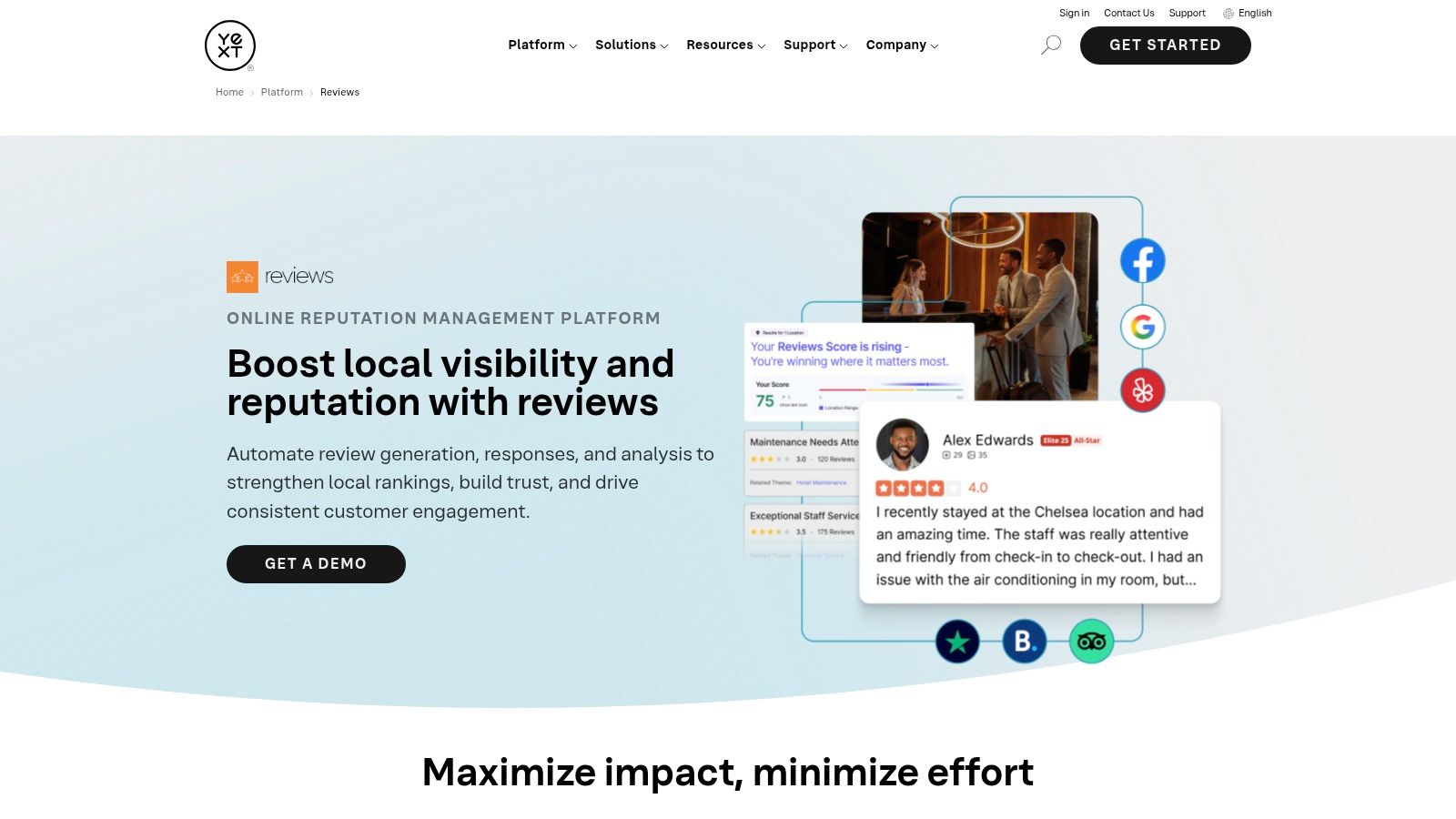
Key Features and User Experience
The platform is built for scale, offering features that streamline workflows for large teams. Its generative AI assists in crafting localized, on-brand responses, saving significant time while ensuring brand consistency. The Reviews Inbox allows managers to assign tasks, set roles, and create automated alerts, preventing any customer feedback from being overlooked. Analytics provide deep insights into sentiment and performance across all locations.
- Generative AI Responses: Creates localized and brand-consistent draft responses to reviews at scale.
- Centralized Inbox: Organizes all incoming reviews with tools for assignment, filtering, and team collaboration.
- Website Review Widgets: Displays first-party and third-party reviews directly on your site, often with schema markup to enhance SEO.
- Comprehensive Monitoring: Tracks reviews across a wide network of major sites and directories relevant to local businesses.
Pros and Cons
Pros:
- Deep synergy with Yext's core listings and local SEO products.
- Excellent enterprise-level admin controls and governance for multi-location brands.
Cons:
- Pricing is not public and requires a consultation or demo to get a quote.
- Some advanced features, like specific widgets, may be limited to higher-tier packages or require an add-on purchase.
Website: https://www.yext.com/products/reviews/
9. ReviewTrackers (an InMoment company) – Review Monitoring & Insights
ReviewTrackers is a powerful platform focused on aggregating customer feedback from over 100 review sites into a single, manageable dashboard. Acquired by InMoment, it excels at providing businesses, especially those with multiple physical locations, a streamlined way to monitor, respond to, and analyze customer sentiment. Its strength lies in making location-based review management scalable and actionable, positioning it as one of the best online reputation management software options for retail, restaurant, and service-based industries.
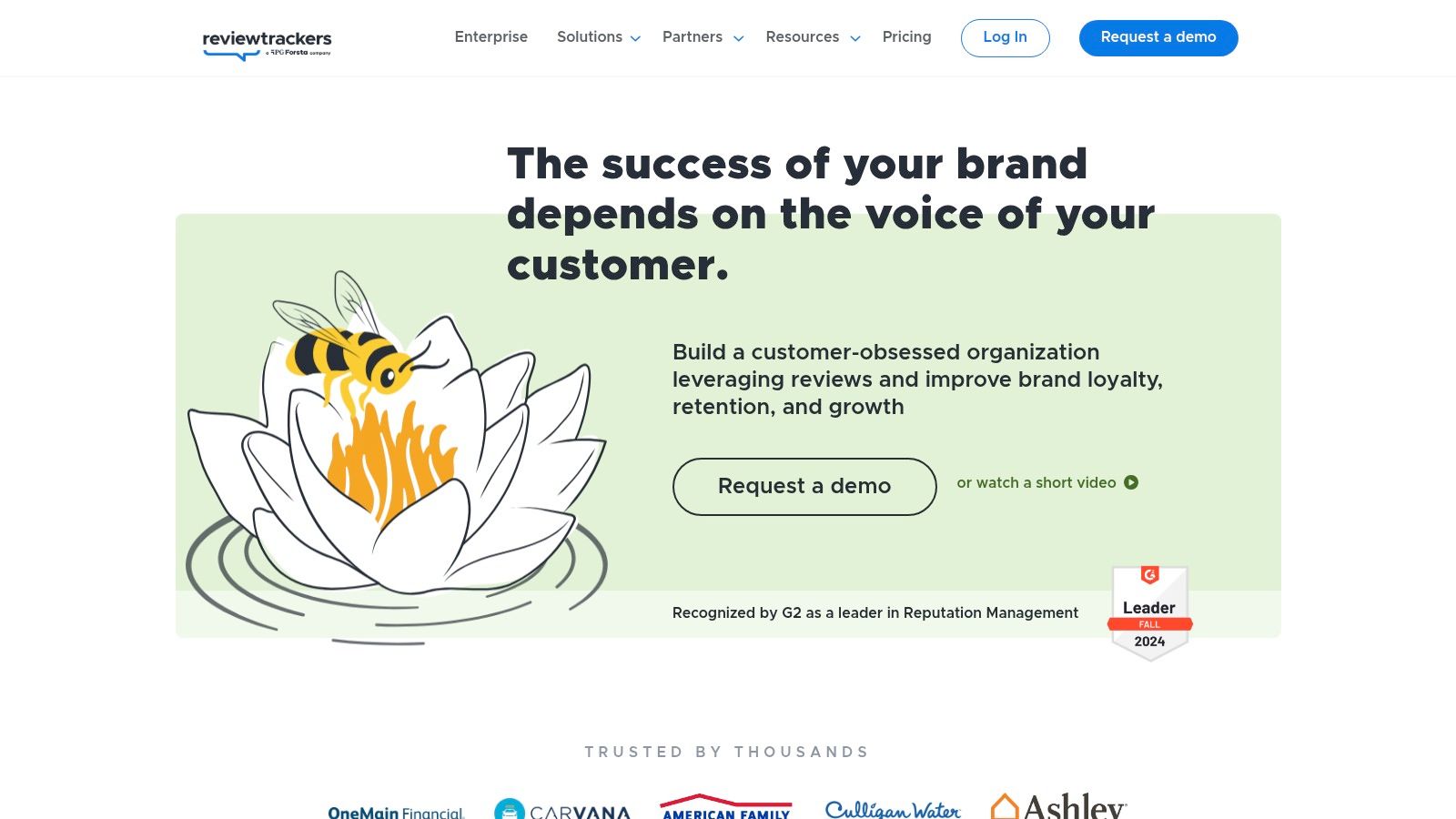
Key Features and User Experience
The platform is designed for ease of use, allowing teams to quickly get up to speed on monitoring and responding to feedback. Alerts keep managers informed of new reviews in near real-time, while AI-assisted response tools help maintain brand consistency and speed up reply times. The optional add-on services, such as local listings management and search rank monitoring, provide a more holistic view of a location's online presence.
- Extensive Review Aggregation: Pulls in customer feedback from more than 100 sources, providing a comprehensive overview.
- AI-Powered Insights: Uses artificial intelligence to analyze review text, identify trends, and suggest response templates.
- Scalable Location Management: The per-location pricing model makes it easy to add or remove branches as a business grows.
- Optional Managed Services: Businesses can offload review response and other tasks to ReviewTrackers' expert team.
Pros and Cons
Pros:
- Extremely easy to deploy and scale for businesses with multiple physical locations.
- Clear and straightforward add-on menu for listings management and local search rank monitoring.
Cons:
- Pricing is entirely gated; you must schedule a demo to get a quote.
- The final per-location cost is variable and depends heavily on the number of locations and selected add-ons.
Website: https://www.reviewtrackers.com/
10. Sprout Social – Review Management inside a Social Suite
Sprout Social is a leading social media management platform that integrates robust review management capabilities into its broader suite. It’s an ideal solution for businesses that want to streamline their social media engagement and online reputation monitoring within a single, unified dashboard. The platform pulls in reviews from key sites like Google, Yelp, Tripadvisor, and Facebook, allowing teams to manage brand perception where social conversations and customer feedback intersect.
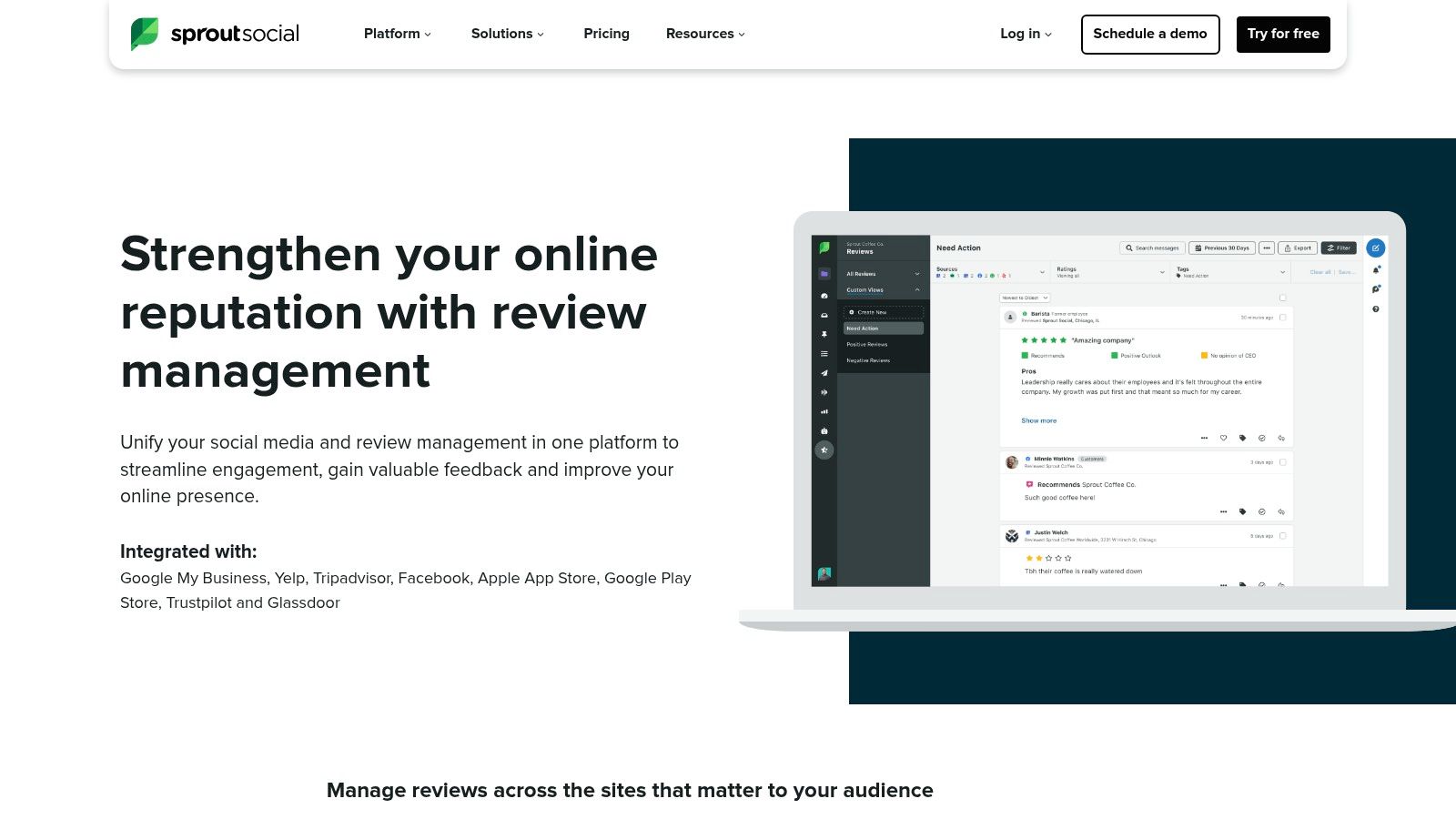
Key Features and User Experience
Sprout Social centralizes reviews into a single smart inbox, similar to how it handles social media messages, enabling efficient monitoring and response. The user experience is designed for collaboration, with workflows that let you assign review responses to specific team members. This makes it one of the best online reputation management software options for marketing teams who already handle social media.
- Centralized Review Stream: Aggregate reviews from Google My Business, Facebook, Yelp, and Tripadvisor into one feed with powerful filtering options.
- Integrated Workflows: Seamlessly combines review management with social publishing, engagement analytics, and social listening modules.
- Multi-Location Reporting: Provides detailed performance reports for businesses with multiple storefronts, tracking review volume, average ratings, and response times.
Pros and Cons
Pros:
- Excellent for consolidating social media and review management, reducing the need for multiple tools.
- Established U.S. vendor known for a polished user interface and extensive third-party integrations.
Cons:
- Pricing is tied to broader Sprout Social plans and add-ons; review features vary significantly by tier.
- May be less specialized for review generation campaigns compared to dedicated ORM platforms.
Website: https://sproutsocial.com/features/reviews/
11. Trustpilot Business – Collect and Showcase Verified Reviews
Trustpilot Business is a well-known public review platform that acts as a powerful reputation management tool, particularly for e-commerce and lead-generation businesses. It helps companies proactively collect, manage, and display verified consumer reviews, leveraging the brand's strong consumer recognition to build social proof and trust. Its primary function is to turn customer feedback into a visible asset for your marketing efforts.
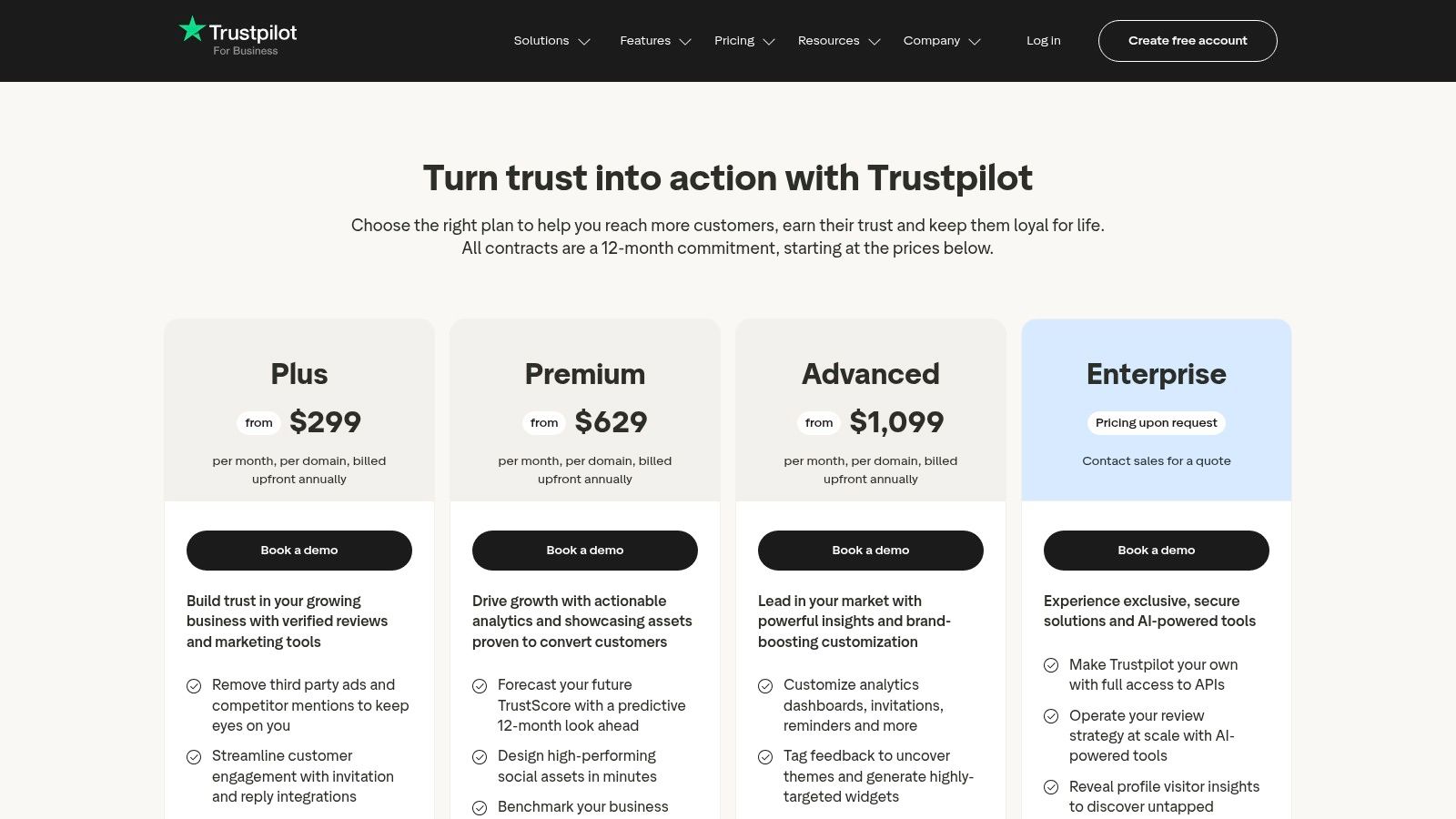
Key Features and User Experience
The platform is built around simplifying the review collection and promotion process. Users can automate review invitations after a purchase or service interaction, which helps generate a steady stream of fresh feedback. This feedback can then be showcased on a public Trustpilot profile and embedded directly onto a company's website using various widgets to improve conversion rates.
- Automated Review Invitations: Send a set number of invitations each month (volume depends on the plan) to systematically gather customer experiences.
- Showcase Widgets: A library of widgets allows you to display your Trustpilot score and latest reviews on key pages of your website, like checkout or landing pages.
- Analytics and Insights: Higher-tier plans provide access to benchmarking data, letting you compare your performance against competitors and analyze review trends over time.
Pros and Cons
Pros:
- Strong consumer recognition and trust can significantly boost conversion rates.
- Transparent plan pricing with a clear upgrade path, starting from a free basic plan.
Cons:
- The platform has faced issues with fake-review abuse, requiring businesses to be vigilant in monitoring feedback.
- The cost for higher tiers (Premium/Advanced) with more advanced features can be substantial.
Website: https://business.trustpilot.com/pricing
12. Brand24 – Media & Review Mentions Monitoring (ORM listening)
Brand24 provides real-time monitoring of brand mentions across a vast digital landscape, including news sites, social media, forums, podcasts, and even YouTube and TikTok. It operates primarily as a listening tool, using AI to track sentiment and detect unusual spikes in conversation. This makes it one of the best online reputation management software choices for proactive crisis detection and understanding brand perception across the web.
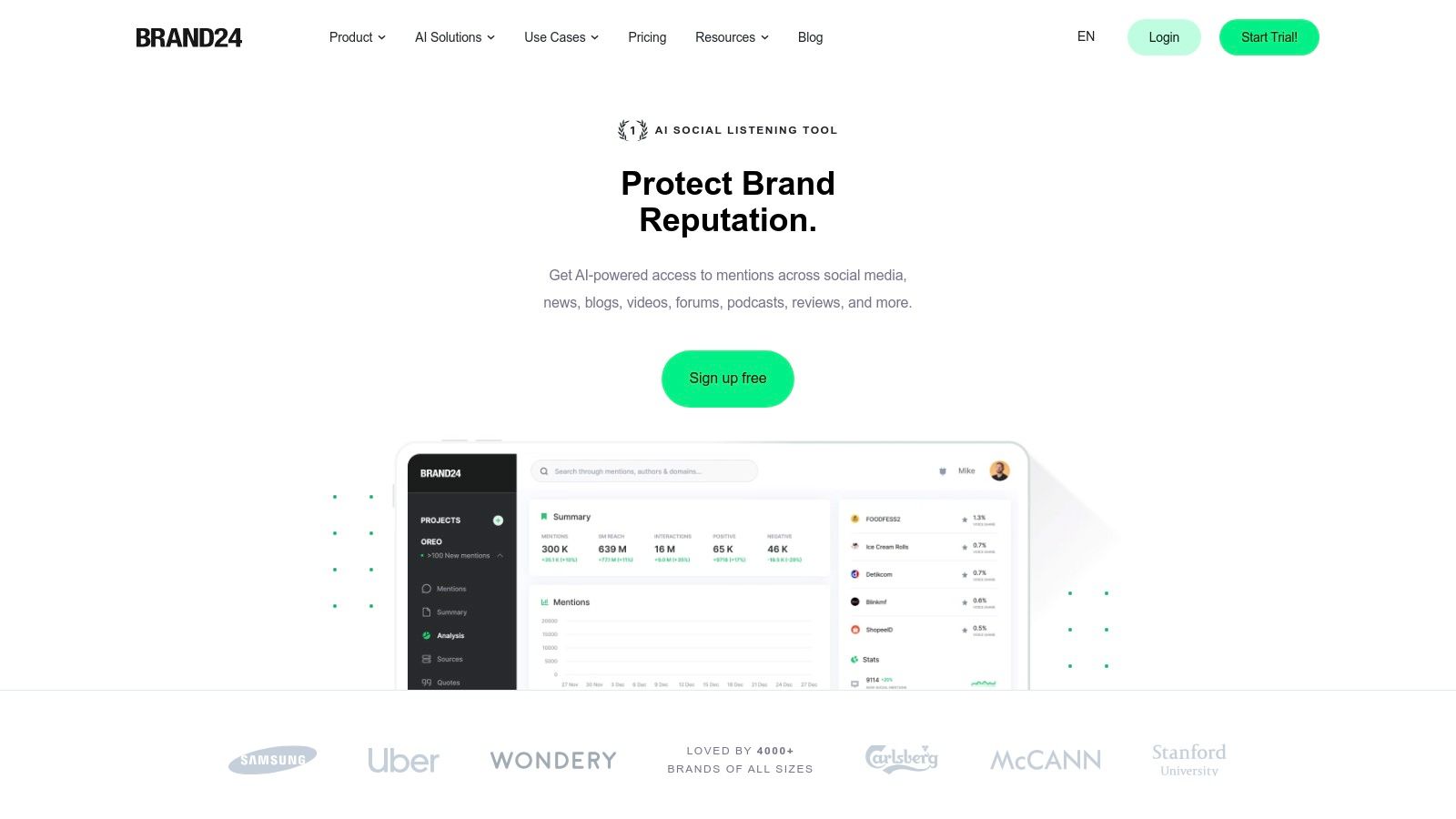
Key Features and User Experience
Brand24 excels at casting a wide net to catch conversations wherever they happen, providing a unified dashboard for analysis. Its strength is in its alert system, which can immediately notify marketing or PR teams of a potential issue, allowing for rapid response planning. While it monitors some review sites, its core function is broader media listening rather than direct review engagement.
- Real-time Monitoring: Tracks mentions across social media, news, blogs, videos, podcasts, and forums as they happen.
- AI-Powered Insights: Automatically analyzes mention sentiment (positive, negative, neutral) and identifies discussion spikes to flag potential PR crises.
- Comprehensive Alerts: Customizable notifications ensure you're aware of critical mentions of your brand, products, or executives instantly.
- Scalable Tiers: Offers multiple pricing plans based on the number of keywords tracked and mentions per month, with a 14-day free trial available.
Pros and Cons
Pros:
- Fast to deploy with powerful, real-time alerting for brand terms and key personnel mentions.
- Excellent for teams needing broad media monitoring that extends beyond traditional review platforms.
Cons:
- Primarily a listening tool; review response and generation workflows are not its focus.
- May need to be paired with a dedicated review management platform for a complete ORM strategy.
Website: https://brand24.com/
Top 12 Online Reputation Management Software Comparison
| Service | Core offering | Quality / UX | Value & Pricing | Target audience | Unique selling points |
|---|---|---|---|---|---|
| 🏆 LevelField | End-to-end takedowns for fake reviews, misleading ads, impersonations, counterfeit listings across reviews/marketplaces/ads/social | ★★★★★ 95% reported review-removal success; confidential, fast workflow | 💰Custom quotes; free case evaluation | 👥 SMBs, e‑commerce, law firms, healthcare | ✨Legal + platform policy expertise; hands-on enforcement; global coverage |
| G2 | B2B marketplace with crowdsourced vendor reviews, grids and shortlists | ★★★★ Deep, up‑to‑date user feedback | 💰Free to browse; vendor pricing via demos | 👥 Buyers shortlisting ORM vendors | ✨Verified reviews, seasonal grids, vendor comparisons |
| Capterra | Category directories, buyer’s guides, side‑by‑side product comparisons | ★★★★ Clear benchmarking UX | 💰Free; shows typical price ranges (many vendors still quote) | 👥 Buyers comparing features & pricing | ✨Buyer guides & side‑by‑side comparison tools |
| GetApp | SMB-focused category leaders and filterable shortlists | ★★★★ Quick SMB-centric shortlists | 💰Free; links to vendor demos | 👥 SMB buyers seeking top-rated tools | ✨Category Leaders scoring (usability, value, functionality) |
| Birdeye | Review generation, monitoring, AI replies, widgets, multi‑location analytics | ★★★★ Strong scaling & reporting for multi‑location brands | 💰Custom/location pricing; demo required | 👥 Local & multi‑location businesses | ✨AI-assisted responses; unified review inbox; marketing widgets |
| Podium | SMS-first review invites, centralized messaging, payments, vertical packages | ★★★★ Excellent SMS UX for local services | 💰Quote-based; per-location SMS/10DLC fees | 👥 Local service businesses (US-centric) | ✨SMS-driven review flows + integrated payments |
| Reputation | Enterprise ORM + CX suite: reviews, surveys, listings, governance | ★★★★★ Enterprise-grade dashboards & governance | 💰Enterprise pricing (quote; Capterra ref ~$299/mo) | 👥 Large enterprises, regulated industries | ✨Closed-loop feedback, multi‑location governance, analytics |
| Yext Reviews | Review generation, AI responses, monitoring, widgets with listings synergy | ★★★★ Good for local SEO + reviews | 💰Quote/demo required | 👥 Multi‑location brands focused on local SEO | ✨Generative AI responses; schema-friendly widgets; listings integration |
| ReviewTrackers | Aggregation from 100+ sources, alerts, AI responses, optional managed services | ★★★★ Easy location-based scaling | 💰Location-based pricing; demo required | 👥 SMBs & mid‑market with multiple locations | ✨100+ sources, competitor insights, managed services option |
| Sprout Social | Social media suite with integrated review monitoring & response | ★★★★ Consolidated social + review workflows | 💰Plan-dependent pricing; review features vary by tier | 👥 Social teams and lean marketing teams | ✨Single platform for social publishing + reviews |
| Trustpilot Business | Public review collection, widgets, benchmarking, verified consumer reviews | ★★★★ Strong consumer-facing social proof | 💰Transparent tiers (free→paid); higher tiers costly | 👥 E‑commerce & lead‑gen brands | ✨Widely recognized consumer review platform; public profiles/widgets |
| Brand24 | Real-time media & mention monitoring (news, social, forums, podcasts, some reviews) | ★★★★ Fast alerts and sentiment/event detection | 💰Tiered plans; 14‑day trial | 👥 PR, comms & crisis teams | ✨Real-time alerts, AI sentiment, event spike detection |
Making Your Choice: When to Use Software vs. a Specialized Service
Navigating the landscape of online reputation management can feel overwhelming. We've explored a wide array of powerful tools, from comprehensive review platforms like Birdeye and Podium that excel at generating positive customer feedback, to enterprise-grade suites like Reputation that unify customer experience data. We've also seen how specialized tools like Brand24 provide crucial brand monitoring, while social media giants like Sprout Social integrate review management directly into your marketing workflow.
The core takeaway is this: selecting the best online reputation management software is not about finding a single magic bullet. It’s about building a strategic toolkit tailored to your business’s specific vulnerabilities and goals. The right platform empowers your team to proactively build a positive brand narrative, engage with customers, and turn feedback into actionable business intelligence.
The Duality of Reputation Management: Proactive Building vs. Reactive Defense
The most effective reputation strategy operates on two parallel tracks: building the positive and defending against the negative. This is the crucial distinction that determines whether a software-only approach is sufficient or if you need to bring in specialized expertise.
For the vast majority of day-to-day reputation management activities, software is your indispensable ally. These platforms are designed for scale and efficiency in tasks like:
- Systematically generating reviews from satisfied customers to bolster your ratings on Google, Trustpilot, and industry-specific sites.
- Monitoring brand mentions and social media conversations to stay ahead of emerging trends or customer service issues.
- Centralizing feedback from multiple channels into one dashboard, enabling your team to respond quickly and consistently.
- Analyzing sentiment and review data to identify operational strengths and weaknesses, from product flaws to exceptional employees.
For SMBs, healthcare providers, and e-commerce brands focused on growth and customer engagement, platforms like ReviewTrackers or Yext Reviews provide the perfect foundation for building a stellar public profile.
When Software Hits Its Limit: The Case for a Specialized Service
However, there is a clear line where automated software capabilities end and the need for human-led, tactical intervention begins. Software is designed to work within platform rules; it cannot effectively combat content that intentionally breaks them.
This is where a specialized service like LevelField becomes not just a benefit, but a necessity. You should consider a service when facing complex threats that require a nuanced, investigative approach, such as:
- Malicious Fake Reviews: A coordinated attack of false one-star reviews from non-customers designed to tank your ratings. Software can alert you to these, but it cannot perform the in-depth analysis and manual escalation required to prove their fraudulent nature to platforms like Google or Capterra.
- Brand Impersonation: Scammers creating fake social media profiles or websites using your brand name and logo to deceive customers. Removing these requires direct engagement with legal and policy teams at Meta, X (formerly Twitter), or domain registrars.
- Counterfeit Product Listings: Malicious sellers on Amazon or eBay using your intellectual property to sell fake goods. This requires a deep understanding of marketplace policies and takedown procedures that software cannot replicate.
- Defamatory Content: False and harmful blog posts, forum comments, or articles that violate a platform's terms of service but require a detailed, evidence-based case for removal.
Your Action Plan: A Hybrid Approach for Complete Protection
The ultimate strategy for robust online reputation management is a hybrid one. Use software for the 80% of work that involves proactive building and monitoring. Then, keep a specialized service on call for the 20% of critical incidents that pose a direct threat to your revenue and brand integrity.
Start by assessing your immediate needs. If your primary goal is to increase your Google rating and streamline customer feedback, begin by implementing a tool like Podium or Birdeye. As you grow, integrate a brand monitoring tool like Brand24 to cast a wider net.
But most importantly, identify your "red line" threats. Know when a problem has escalated beyond the capabilities of your internal team and software. By combining the scalable power of the best online reputation management software with the surgical precision of an expert service, you create a comprehensive shield that not only amplifies the good but decisively eliminates the bad. Your brand's reputation is your most valuable asset; protect it with the right combination of tools and talent.
